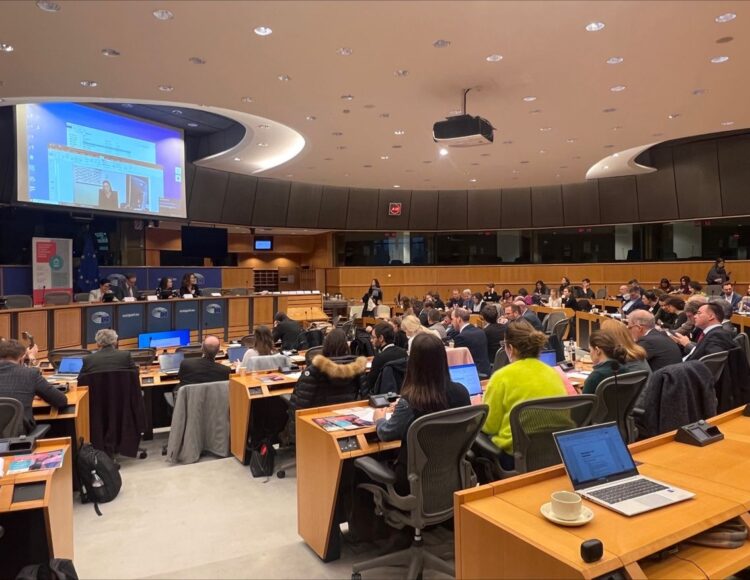Housing Europe’s Manifesto to lead the way out of the housing crisis was backed up by current Members of the European Parliament from five EU political groups, namely Barry Andrews (Renew Europe), Leïla Chaibi (The Left), Kim van Sparrentak (The Greens), Elisabetta Gualmini (S&D), and Dennis Radtke (EPP). They stressed that access to housing should be in the centre of political programmes ahead of the European elections.
MEP Barry Andrews highlighted the pervasive challenges of inflation, rising construction costs, increased interest rates, and a shortage of labor across various Member States. Despite each country having its unique characteristics, Andrews stressed the potential for governments to draw inspiration from successful models in addressing these issues. Addressing the deepening of the housingcrisis, MEP Kim Van Sparrentak reminded that housing solutions cannot be confined to local, national, or European levels alone. She insisted that the EU’s impact through existing legislation must be acknowledged, calling for the establishment of an EU Commissioner dedicated to leading the way out of the crisis. “Instead of navigating blindly”, she advocated for the development of a coherent strategy to effectively tackle the housing problem.
Christophe Collignon, Wallonia’s Housing Minister stressed the need for concerted European action to address the ongoing housing crisis and said that the Belgian Presidency of the Council of the EU will insist оn the fundamental right to housing, as enshrined in Article 25 of the Universal Declaration of Human Rights. To this end, Belgium is calling for a European New Deal for housing, and we will be hearing more about this during the European Conference of Housing Ministers on March 5, 2024, in Liège which the Belgian EU Council Presidency is organising with the support of Housing Europe.
Bent Madsen, President of Housing Europe, set the tone by emphasising EU’s potential to either support socially inclusive and sustainable housing or exacerbate the current crisis. He outlines the three key steps in Housing Europe’s Manifesto for the EU to play a pivotal role: embracing a new housing paradigm, supporting a fair energy transition, and addressing the root causes of housing exclusion and homelessness.
Giulio Romani, Confederal Secretary of the European Trade Union Confederation (ETUC), underlined the importance of implementing the European Pillar of Social Rights, particularly focusing on access to decent and affordable housing. Romani highlighted the significant shortage of affordable housing across European regions and urged the EU to take action to ensure social protection measures, emphasising the need for the European Stability and Growth Pact to safeguard social housing investments.
Andrea Colantonio, Lead Economist at the European Investment Bank (EIB), commended the Housing Europe Manifesto for drawing attention to the growing challenges in the availability and affordability of housing in the EU. He pointed out the EIB’s substantial support for affordable and social housing over the past 25 years. However, the EIB underscored the increasing investment gap and the EIB’s efforts to adapt loan terms, provide financial advice, and extend implementation calendars to address the rising costs in the sector.
Michaela Kauer, Head of the Brussels Office of the City of Vienna and a member of Eurocities’ Executive Committee, also brought up the need for EU funding to shield against speculation and gentrification. Kauer advocated for a multi-level governance approach involving cities and regions and stressed the importance of mainstreaming a strong gender dimension in EU policies related to housing affordability and energy poverty.
Hearing the voice of tenants, Barbara Steenbergen, Head of the EU Liaison Office and Member of the Executive Committee at the International Union of Tenants (IUT), called for the recognition of housing as a fundamental right. IUT proposed a maximum of 25% housing costs as a percentage of disposable income, effective rent regulation until 2030, a 30% quota for social and affordable housing, and the establishment of an EU fund for public social and affordable housing.
The European Commission and Ruth Paserman, Director General of DG EMPL acknowledged the limited competence of the Commission in social housing policy. While the ESF+ and ERDF support social accompaniment and construction or renovation works, Paserman referred to the need for Member States to invest and regulate the sector.
Housing Europe’s member and Chairman of the Estonian Union of Co-operative Housing Associations, Andres Jaadla is drafting a report for the European Committee of the Regions that dives into smart, sustainable, and affordable housing as a tool for local authorities to address multiple challenges. He explained that his report is responding to a resolution from the European Parliament, highlighted initiatives such as the Vienna Model of Social Housing, Housing First model, and prefabricated renovation model.
“The new housing paradigm must change and we need the next European Commission and Parliament to support it strongly,” Sorcha Edwards, Secretary General of Housing Europe concluded and reminded that it is our moral imperative to #VoteNewHousingParadigm.
